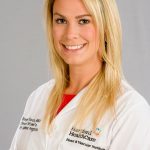According to the American Heart Association, every 39 seconds someone in the United States dies from heart disease. That calculates out to more than 2,200 deaths every day. Heart disease is the No. 1 cause of death among men and women.
“About 80 percent of heart disease is actually preventable by controlling the risk factors,” said Dr. Stephanie Saucier, a Heart & Vascular Institute cardiologist at The Hospital of Central Connecticut.
February is American Heart Month, which shines a spotlight on cardiovascular health. Heart disease can come in the form of several types of conditions, such as coronary artery disease, congestive heart failure and peripheral artery disease.
Dr. Saucier says heart disease risk factors include:
- Smoking.
- High blood pressure or cholesterol.
- Obesity.
- Poor diet.
- Diabetes.
 Dr. Stephanie Saucier
Dr. Stephanie Saucier
“This is why it’s so important for people to eat healthy, watch their weight, get at least 150 minutes of moderate exercise a week, control their blood pressure and not smoke,” she said.
Heart disease is just one of the contributing factors that could lead to a heart attack, which happens when a blockage reduces blood flow to the heart.
“Men and women can both display classic signs of a heart attack, like chest pain, pain radiating down the left arm and shortness of breath,” said Dr. Saucier. “Woman are more likely to have atypical symptoms. They describe the pain in their chest as dull, they’ll experience nausea or fatigue. For women a heart attack can be triggered by emotional or physical stress. With men it’s more physical stress.”
Not all heart attacks are sudden and can display very mild symptoms. If someone is experiencing pain or discomfort in their chest often, it could be due to reduced blood flow, which could lead to a heart attack.
“You know your body and if you feel like something is wrong or you’re experiencing symptoms that are not normal, you should see a cardiologist,” said Dr. Saucier.
Dr. Saucier is also seeing patients coming in through Hartford HealthCare’s COVID Recovery Center (860.827.3200), which is the state’s first center focused on health and healing after recovering from COVID-19. The center helps people who are experiencing persistent health issues.
“From a cardiology standpoint, we are seeing patients who, post-COVID, are having shortness of breath with exertion, rapid heartbeats, irregular heartbeats and some people have chest pain after having COVID,” said Dr. Saucier. “These are people who had underlying heart issues prior to getting COVID, but some of them had no heart issues and are experiencing new symptoms. If you are experiencing any type of issue, tell your doctor so we can evaluate these symptoms and see if it’s something that will improve with time or an issue that needs more attention.”